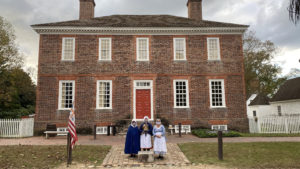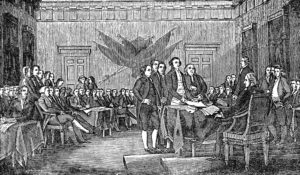
If you visit Colonial Williamsburg, you can tour the home of a member of our family, George Wythe (1726-1896). He was an eminent Virginia judge, member of the Continental Congress, and signer of the Declaration of Independence. The Wythe home is one of the original structures in Williamsburg, finished in 1754. It was one of the finest homes in the city, located on the grassy mall between the Governor’s Palace and the Bruton Parish Church.
The Mullins family relationship to George Wythe is at the level of first cousin. Specifically, we share George Wythe’s grandparents in our common lineage, Col. George Walker I (1659-1732) and Anne Keith (1674-?). George and Anne’s daughter Margaret Walker (1691-1728) was George Wythe’s mother. Their son George Walker II (1698-1773) was the next in our lineage.
Accordingly, George Wythe was a first cousin of George Walker III (1734-1800). Wythe did not have children, so the Mullins family members are among George Wythe’s closest living relatives.
Signing The Declaration Of Independence

Thomas Jefferson and John Marshall both read law with George Wythe and revered him as their mentor. When the Declaration of Independence was signed, Wythe was still en route to Philadelphia. The other members of the Virginia delegation left a space above their signatures, so Wythe could be the first of the 7 signatories from Virginia.
Attempts To End Slavery
Although he held enslaved people most of his life, Wythe was an early abolitionist and gradually manumitted the enslaved people he held after his second wife died in 1787. In 1806, he tried to end slavery in Virginia with a judicial decision in which he freed a family of American Indian descent, based on the 1776 Virginia Declaration of Rights. The Virginia Supreme Court upheld his decision, but not the legal reasoning that would have ended slavery for all.
Of note, one of our common ancestors with George Wythe was his great grandfather, Rev. George Keith, a Quaker minister who wrote one of the earliest recorded pleas for the abolition of slavery in the Colonies in the 1690s. Wythe was likely aware of this family history, and it may have gradually impacted his beliefs.
Trial of the Century
George Wythe lived to age 80, but came to an unfortunate end: he was poisoned by a ne’er-do-well great nephew, George Sweeney. Sweeney was deeply in debt, and poisoned his great uncle to inherit the considerable estate. As it happened, Wythe took 2 weeks to die from the poisoning, and wrote young Sweeney out of his will.
Sweeney was acquitted of murder in a sensational trial that may have been this country’s first “Trial of the Century”, recounted in a recent book “I Am Murdered” by historian Bruce Chadwick: the jury felt that the evidence was too circumstantial. However, Sweeney was convicted of check forgery, served a prison term in Richmond, then moved to Tennessee where he was convicted of horse thievery, and was again sent to penitentiary. After that, young Sweeney was lost to history, just as well.
George Wythe’s Funeral
Wythe’s funeral in Richmond was the largest in state history to that time; businesses closed for the day and thousands lined the funeral route. He was buried at St. Johns Church, where Patrick Henry had given his “Give me liberty or give me death!” speech 31 years earlier.
© 2013 W. Mullins
